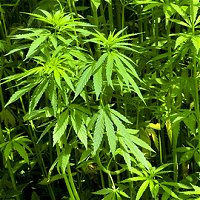The Menominee Indian Tribe of Wisconsin is outraged by the actions of agents from the USA’s Drug Enforcement Agency who have reportedly destroyed the Tribe’s industrial hemp crop.
The Tribe says its industrial hemp crop was always intended to be a legal crop as permitted by the 2014 Farm Bill. To make matters worse, the agents allegedly “improperly” entered what is sovereign land.
“I am deeply disappointed that the Obama administration has made the decision to utilize the full force of the DEA to raid our Tribe. We were attempting to grow industrial hemp for research purposes in accordance with the farm bill,” said Menominee tribal chairman, Gary Besaw.
“We offered to take any differences in the interpretation of the farm bill to federal court… I just wish the President would explain to tribes why we can’t grow industrial hemp like the states, and even more importantly, why we don’t deserve an opportunity to make our argument to a federal judge rather than having our community raided by the DEA?,” said Chairman Besaw.
Twenty-two US states have enacted state laws relating to industrial hemp so far, which is a different crop to medical marijuana. A major point of difference is industrial hemp has very low levels of tetrahydrocannabinol (THC), the psychoactive compound of marijuana. Industrial hemp is grown for its fiber and seed, used in a variety of applications.
The 2014 federal Farm Bill enabled universities and state departments of agriculture to begin cultivating industrial hemp for limited purposes under strict conditions.
The Tribe says it has been transparent with the U.S. Attorney’s Office regarding its hemp crop. Earlier this year, under an agreement with College of the Menominee Nation ( which it classifies as an “Institution of Higher Education”) permission was granted by the Tribe to conduct industrial hemp research.
However, the Tribe acknowledges disagreement between it and Acting U.S. Attorney Greg Haanstad with regard to the legality of its actions; a disagreement the Tribe was quite happy to battle in court.
That aspect aside, the Tribe says Department of Justice policy “strongly discourages” federal law enforcement agencies from enforcing federal cannabis laws in Tribal jurisdictions that have legalized cannabis as long certain priority factors are not implicated; which the Tribe says are not present in this instance.
For its part, the DEA has had little to say on the destruction of the crops to date and at the time of writing, no arrests have been made.
“In light of the actions by the Department of Justice today, the Tribe now has no choice but to move forward with litigation to settle the question of its ability to grow industrial hemp under the 2014 Farm Bill,” said Chairman Besaw.
Chairman Besaw’s full statement can be read here.


